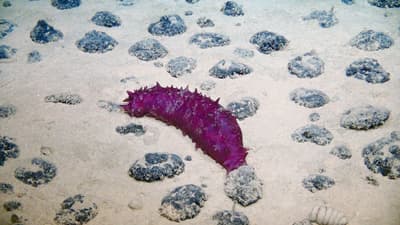Yale Environment 360: How do you view President Trump’s recent executive order on deep-sea mining?
Jeff Watters: It’s deeply concerning, particularly in a moment when the administration is proposing massive cuts to NOAA. The agency is tasked with not only understanding the ocean and understanding the world around us, but also with being a steward of the marine environment. And so there’s a certain irony to the administration issuing an executive order directing NOAA to expedite and facilitate what would be a massive new extractive industry on the high seas.
e360: The U.S. is not the only player here. The International Seabed Authority has been discussing whether or not to allow deep-sea mining for many years now. They have not yet sanctioned it.
Watters: There’s a very robust years-long dialogue that’s been happening at the ISA about whether or not deep-sea mining should happen in international waters and at a global scale. Quite a few countries are opposed to pursuing [it].
e360: The head of The Metals Company says the International Seabed Authority is “stalling” to prevent mining from ever happening. Has that been the intention?
Watters: It’s in the eye of the beholder, right? That company has an interest in wanting to proceed with deep-sea mining, but others would offer the perspective that the global community is trying to be prudent and cautious and precautionary in the way they approach a potential new extractive global industry. In our view, the last thing we need to do is conduct a live experiment that potentially ruins many aspects of the environment or causes long-lasting damage.
“Unilateral action to pursue deep-sea mining opens up a whole Pandora’s box of questions in terms of conflict on the high seas, conflict between nations.”
e360: In terms of international law, aren’t the high seas owned collectively by everyone, instead of being parceled out nation by nation?
Watters: Yes, and I think that’s the fundamental challenge with the approach the administration is taking. A decision to unilaterally embark on deep-sea mining runs counter to the way we as a global community have been cooperatively working on the high seas for decades now. Unilateral action to pursue deep-sea mining opens up a whole Pandora’s box of questions in terms of conflict on the high seas, conflict between nations, and whether or not this is an extractive industry that we even need.
e360: Some in the mining industry argue that this is necessary to obtain rare-earth metals that are critical for the development of green technologies. They also say that it’s less invasive than mining on the land. What do you make of these arguments?
Watters: Our economy needs certain materials to run. And if there’s a shortage of those materials, or if those materials are highly priced, you have an array of options. Deep-sea mining is just one option. You can also have policies that will incentivize recycling of those materials within your economy. You can pursue research and development that will reduce the need or the demand for them. Those in government have the responsibility to look at the full array of options. Any individual company telling you that their solution is the only solution deserves a healthy dose of skepticism.
Scientists say helmet jellyfish, like this one, would be threatened by plumes of sediment from seabed mining. Vanessa Stenvers / GEOMAR
e360: One of the worries is mined areas will be permanently destroyed. Do we know that, or can these areas recover?
Watters: There is evidence from areas where seabed mining experiments have been conducted that the damage can persist for 50 or more years. These environments develop and evolve over very long timescales. It’s not like cutting down a forest, where it will grow back within years or decades. We’re talking about geological and biological timescales that function on a very different order of magnitude from our own.
e360: Fishing boats are already trawling the sea bottom with huge nets, doing a lot of damage to the ocean floor. Is this a preview, in some way, of what might be in store if we started mining the deep sea?
Watters: In trawling, the goal is not to scoop up the physical elements of the seabed itself. You’re trying to get fish. Damage caused to the seabed is collateral damage. Whereas with deep-sea mining, you are literally trying to extract the mineral resources of the seafloor and remove them intentionally in a methodical way.
“Do we want to experiment with the destruction of these environments before we even know what’s there?”
e360: People often think of the deep sea as a desert that is virtually devoid of life, but that’s not the case. What kind of creatures live in these areas?
Watters: You’re talking about extreme environments. This is life that, in some cases, doesn’t depend on photosynthesis. Some of these species look like creatures out of a horror film, while others are awfully dang cute. These animals are living under unbelievable amounts of pressure in a cold and zero-light environment. They have to endure and flourish in a set of conditions that is completely unlike anything we’ve ever experienced. Many of them create their own light, or bioluminescence, to either hunt or to get around. It is a testament to the beauty and incredible power of evolution.
e360: I understand that every time we go down and take samples from the deep-sea floor, we come up with species that are unknown to science.
Watters: It’s awe-inspiring. Do we want to be in the business of experimenting with the destruction of these environments before we even know what’s there, and before we know the potential that these organisms might have to expand our understanding of life and biochemistry?
e360: How would you rate the threat of deep-sea mining compared to other threats facing the oceans?
Watters: The big three areas of damage at the highest level are climate change, pollution, and biodiversity. Deep-sea mining would impact all of these. There are potential pollution impacts, depending on the specifics of the mining activity. Deep-sea mining would also contribute in a very real way to the biodiversity crisis, since you’re destroying habitat and conducting an activity that is damaging whole ecosystems. What we know less about are the potential implications for the deep ocean’s role in the carbon cycle, and whether mining would disrupt that. But there are some folks out there who are deeply concerned about those potential effects as well.
e360: It’s easy to get depressed about the state of the ocean and the state of the environment more generally. Do you see any reason for hope?
Watters: When you look at popular culture, when you look at documentaries like Blue Planet, you see that people are incredibly intrigued by the mystery of the ocean and want to learn more about it. Nowadays, when so much of the world can sit in the palm of your hand through your phone and everything seems digital, accessible, and knowable, people are hungry for things that are mysterious.
Furthermore, there is a growing awareness of the problems that face us. Take plastic pollution. There has been a lot of attention paid to this problem recently, and there is an immense appetite and eagerness across the global community to try to find solutions. That makes me optimistic.
The reaction to [the Trump administration’s] executive order to permit deep-sea mining shows that many people are appalled and upset about the notion that we would develop this new global extractive industry. It’s a sign that people are aware and engaged and want to prioritize a healthy ocean.
This interview was edited for length and clarity.






